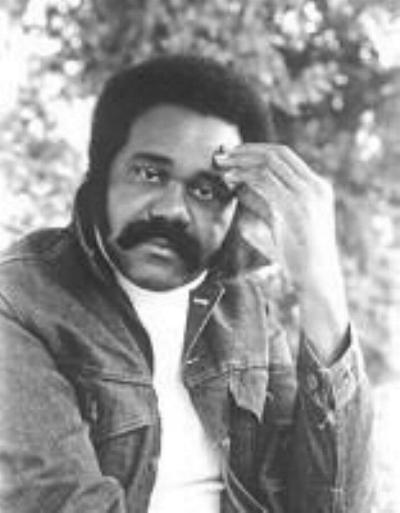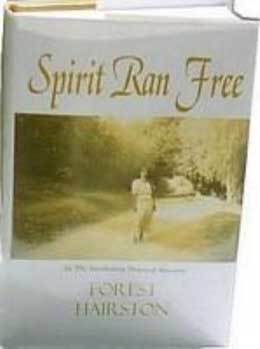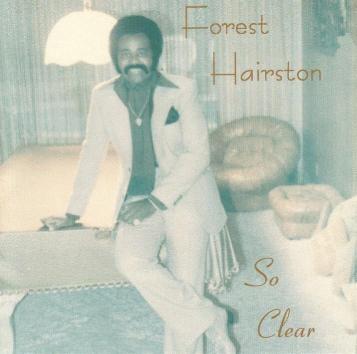‘Marvin could take a vague musical idea scribbled on notebook paper into the studio, and come out with a song that would last forever.’Marvin Gaye Sings a Christmas Song
by Forest Hairston
(Ed. Note: Songwriter Forest Hairston and his friend Marvin Gaye are credited as co-writers of “I Want To Come Home For Christmas,” a song Gaye recorded in 1972 around the time he was working on his Trouble Man album. The song was supposed to be released as a Tamla single that year, but was withheld and did not see the light of day until 1990’s four-CD box set, The Marvin Gaye Collection. Herewith a personal account by Hairston of how the song came to be, what Marvin did with it, and its bittersweet aftermath.)
When his life passed down through the years from the Moonglows to his last breath, I wonder if Marvin Gaye ever knew that he was a musical genius. I'm sure that people who knew Marvin and worked with him throughout his fantastic career would still look Marvin Gaye straight into his face and tell him that he was indeed a genius. Marvin could take a vague musical idea scribbled on notebook paper into the studio, and come out with a song that would last forever.
Forest HairstonIn the early days after his first smash hit "I Heard It Through The Grapevine," Marvin was often called the Motown Prince. He always laughed about that. But then, Marvin Gaye loved to laugh. Yet, there was a melancholy ache inside that he could only explain with words and music. And the world can become a lonely place for those who dare to touch upon greatness. Marvin Gaye would rather sing soft romantic songs, and he'd rather touch you more deeply beyond what he saw in your face. He'd just as soon play a hard, knock down game of basketball or golf, or toss a baseball with you any day, at any time.
Early in the seventies, he asked the world "What's Going On." Sang songs about ecology and about saving the children. All the world should have listened to Marvin Gaye. The tall, suave, good-looking fellow born in Washington, D.C., on April 2, 1939, was a star. He became a star somewhere long ago during his Motown experience singing songs like "Stubborn Kind Of Fellow." So even before he confronted the world about what was going on, Marvin Gaye was already a star.
Quite obviously, for personal reasons, I always deeply think about Marvin around our Christmas holidays. Yet still throughout the year, I often listen to a beautiful song that I wrote in 1972. It was a time when everyone across America and where I lived in Hollywood, California, was wearing a yellow ribbon in honor of our Vietnam prisoners of war. Personally, I just wanted to do something a little more to help get our guys home in time for Christmas. I was sitting at my keyboard kicking the song around and still working on the chords, when Marvin just happened to drop by.
"Hey, what's happening? What you doing, man?" he asked.
"I don't know. I'm just sitting here messing with a Christmas thing for the Vietnam dudes, you know."
"Christmas? Humph . . . I need me a Christmas song. What you got?"
"Nothing. Ain't got nothing. No studio demo or nothing yet, baby brother. Just a piano tape with the words and melody. But check it out for a second." I smiled, as my fingers hit the keys on my new electric Rhodes piano with a little four bar introduction. At that, I went into the words and pulled out the soulful feeling. I hadn't even gotten through the first verse when Marvin jumped up ecstatically.
"Wait a minute! I mean hold it! Let me think a minute. Awesome!" he yelled, snatching up the words I'd scribbled on my marked-up notepad. "Forest, what is this?" he asked breathlessly, reading the words aloud. "I'd give anything to see a little Christmas tree. And then, man, you got it called, 'I Want To Come Home For Christmas'. . . Awesome!"
He glared at me silently for a few seconds. "Forest, give it up! The song is finished, man. Please, just give me what you got. I mean, a Christmas song about our guys over there in that Vietnam War! Hey, I've got to get into the studio, man. We don't have any time on this."
Absolutely, we were real close to the deadline for cutting a Christmas record. But Marvin rushed out to his car clutching the cassette with my words and music in his hand. He then hung out in a Hollywood recording studio nonstop around the clock for three days and three nights. Immediately after the final mix, he anxiously stormed into my apartment, slipped the cassette in my system and paced around nervously while the music played. I listened carefully, but I couldn't believe it. The song was absolutely glorious! The arrangement was awesome, and the rhythm track was twenty years ahead of its time. Besides, I'd never heard Marvin sing any better.
I was nearly speechless and filled up with deep emotion, so I just grabbed Marvin and hugged him tightly. "I love you, Marvin Gaye. You are a genius, man." Marvin Gaye laughed. He always laughed—and he laughed at me for saying that. But he and I were both extremely sensitive to the Vietnam War, and when I started to cry, he began crying as well. My wife just stood there and watched two grown men hugging, laughing and crying their eyes out.
Getting such a great song on the charts performed by Marvin Gaye was supposed to be my songwriter chance of a lifetime. Marvin was coming off his 1971 hit album What's Going On and he badly wanted this Christmas song about the prisoners of war to hit the air before the Christmas holidays of 1972.
However, to this day, I seriously doubt that anyone ever knew that our song was all about getting our guys home from Vietnam before Christmas. For whatever reason, Motown made the crucial decision not to release our heartfelt song. When Marvin called to break the terrible news, he was gripped with piercing anguish. It was a horrible time for both Marvin and me. All our effort seemed wasted. I think I just laid down and died for at least two months before I was able to pull myself together.
Nearly twenty-five years passed, and while my career as a songwriter was going quite well, Marvin Gaye had tragically gone on to be with God. One afternoon, I was feeling kind of low when I opened an envelope from Motown, and received the shock of my life. It was a huge royalty check for a song called "I Want To Come Home For Christmas," artist Marvin Gaye, written by Forest Hairston. That stilled moment was unforgettable. I wanted to cry again for myself and for Marvin, and for the Vietnam guys who never made it home for the Christmas of 1972. But all I could think about was that Marvin Gaye was right there with me laughing up a storm. So I just stood there with the royalty check in my hand and sadly tried to laugh.
I learned sometime later that someone at Motown had found our song and described it as a timeless Christmas masterpiece, which Marvin Gaye had recorded some time ago. It was then posthumously released with the famed four CD set called The Marvin Gaye Collection. I was extremely honored to know that our song had been included along with many of Marvin's most treasured hit records.
Marvin Gaye was a gentle, deeply sensitive man. And indeed, he was a genius.
For more of Forest Hairston’s writing, visit his website,
www.blackvillage.com, where his novel, Spirit Ran Free, and his CD of love songs, So Clear, are both for sale.
Founder/Publisher/Editor: David McGee
Contributing Editors: Billy Altman, Laura Fissinger, Christopher Hill, Derk Richardson
Logo Design: John Mendelsohn (www.johnmendelsohn.com)
Website Design: Kieran McGee (www.kieranmcgee.com)
Staff Photographers: Audrey Harrod (Louisville, KY; www.flickr.com/audreyharrod), Alicia Zappier (New York)
E-mail: thebluegrassspecial@gmail.com
Mailing Address: David McGee, 201 W. 85 St.—5B, New York, NY 10024





